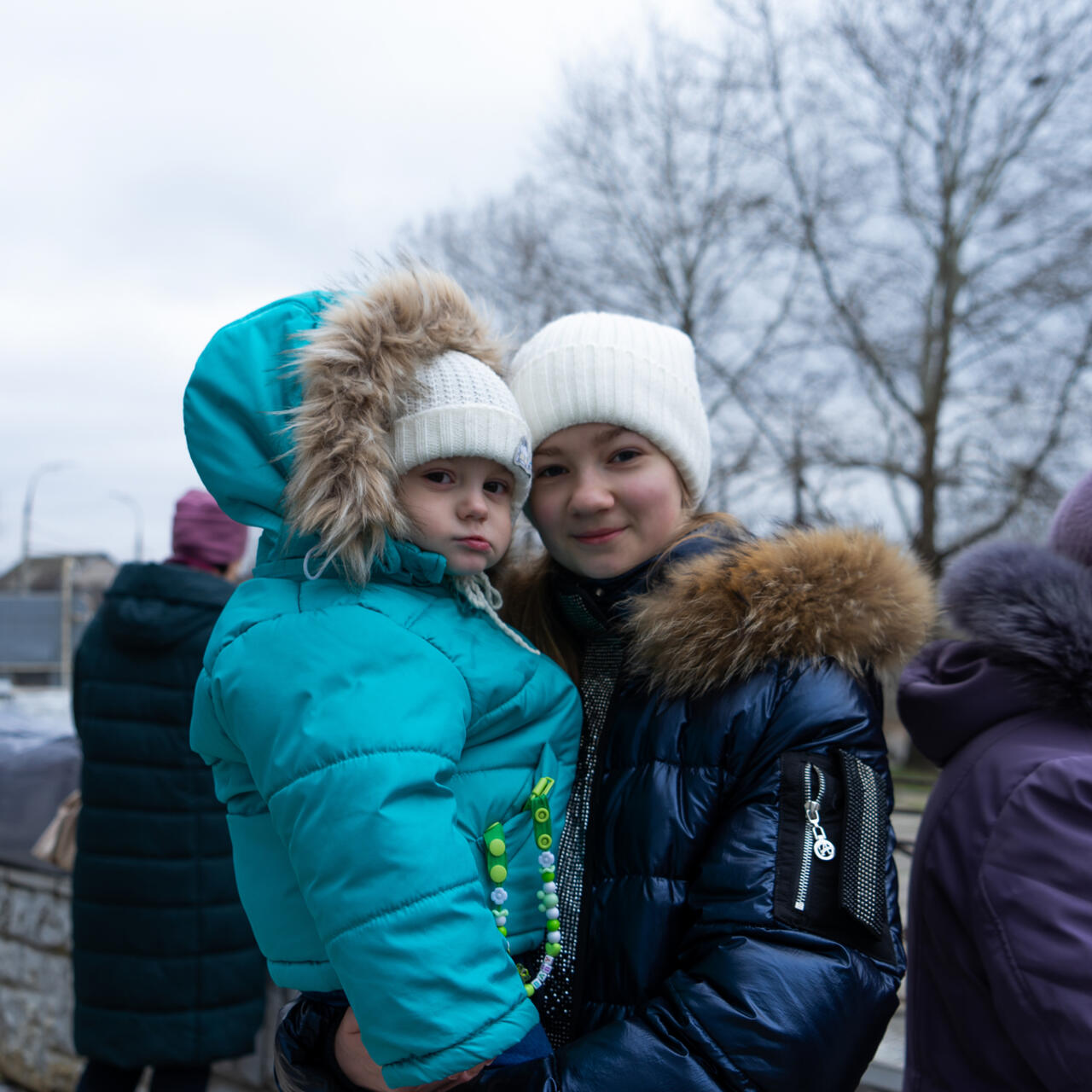
Ukraine war: One year of IRC support
Learn how the IRC has been on the ground in Ukraine and neighbouring countries, supporting people whose lives have been disrupted by the conflict.

Learn how the IRC has been on the ground in Ukraine and neighbouring countries, supporting people whose lives have been disrupted by the conflict.
One year on, there is no end in sight to the war in Ukraine. Millions of people have been forced to flee their homes, while many still inside the country are unable to access enough food, water or electricity. Meanwhile, the war’s impact has accelerated crises far beyond Ukraine’s borders.
When the war in Ukraine escalated on February 24, 2022, the International Rescue Committee (IRC) was already in neighbouring Poland monitoring the rising tensions. We immediately deployed teams to Ukraine to assist people displaced by fighting and to the Poland-Ukraine border to support arriving refugees.
We partnered with local organisations to bolster their efforts, and scaled up our response at record speed, reaching 2.7 million people with crucial in-person support and online information services over the last year.
Below, a look at the ways we are providing vital assistance to people impacted by the ongoing conflict in Ukraine—wherever they are in the world.
People experiencing crisis know best what their families need. Direct cash payments have proven to be one of the most effective ways to help them survive and recover. To date, we have reached almost 150,000 people affected by the war in Ukraine and Poland with cash assistance.
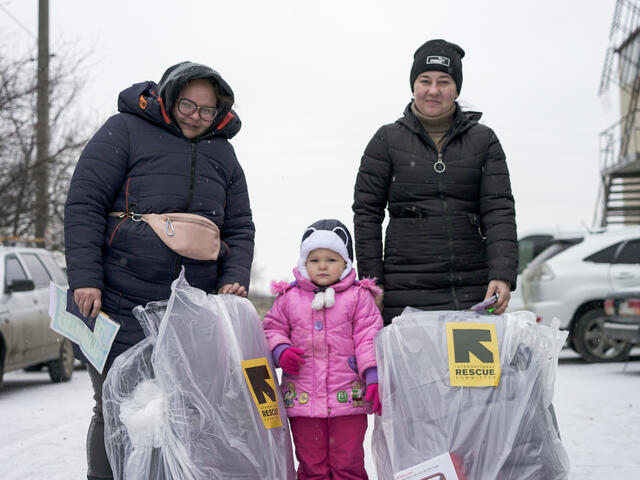
“There are situations where we see half of the community has been destroyed, like all of the buildings, all of the villages, unfortunately,” says Mykola Lialenko, the IRC’s acting cash and basic needs manager in Odesa, Ukraine. “A lot of people have fled and they moved with nothing.”
“Our aim is to help them find solutions to give them the opportunity to buy some food, to pay for rent, to cover their basic needs. Often people also use the cash to buy clothes, because the weather is changing. ”
“When you give people money you give them a choice,” says Lialenko. “They can decide exactly what they need.”
When you give people money you give them a choice. They can decide exactly what they need.
In parts of eastern and southern Ukraine affected by shelling, people’s ability to purchase what they need has been compromised by shuttered stores, empty ATMs and suspended money transfers.
In these places, tangible goods are the most effective relief. Since February 2022, IRC teams have provided displaced people with items such as toothbrushes, soap and other hygiene products; women and adolescent girls with clothing and menstrual products, and children with toys, games, and activity books to help them cope with the crisis around them.
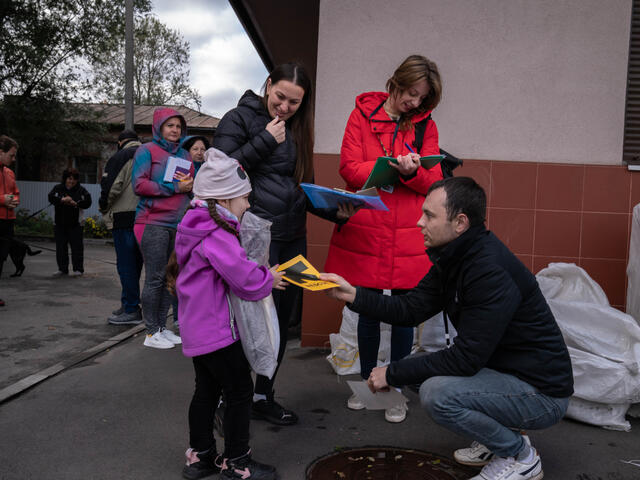
A few months ago, as the cold weather returned, attacks targeting Ukraine’s power grid made blackouts a common occurrence. On a single day in mid-November, intense fighting left more than seven million Ukrainians without electricity.
Lack of power and heat became life-threatening, particularly for people without adequate shelter, as temperatures plunged well below freezing.
The IRC quickly scaled up our response to provide people with blankets, quilts, sleeping bags, stoves, power banks, heaters and fuel. In areas close to the frontlines, we have been providing plywood and other materials to seal windows damaged by shelling.
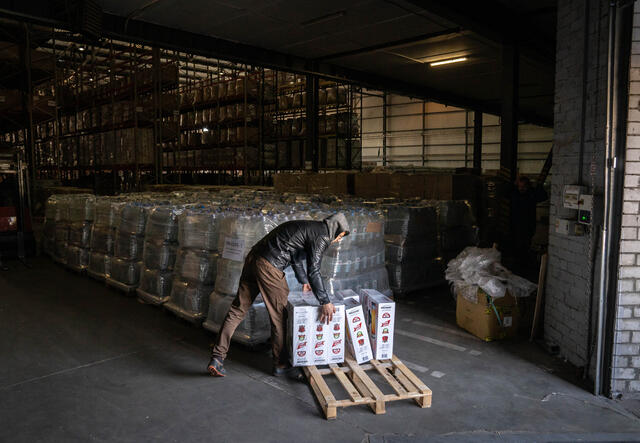
“We met one old woman, about 78 years old, who hadn’t had heating in her apartment for more than three weeks,” says Lialenko. “We provided her with sleeping bags, blankets, a portable charger and an electric heater. With our partners we also covered her damaged window. The woman started to cry, because before that, she didn't know what to do.
“It’s very easy to stay motivated when you know your work can save lives,” he added.
The majority of people who have left Ukraine are elderly, or women and girls. Many of them did not have time to gather passports and birth certificates as they fled, which are needed to register for services or get jobs in host countries.
Women and girls inside the country also face extraordinary challenges, illustrated by the tragic and horrifying images of a Ukrainian woman being evacuated from a maternity ward in Mariupol. As in any crisis, women and girls affected by the war in Ukraine are at greater risk of sexual violence, gender-based violence, and trafficking.
The IRC works to protect and support all women—whether they are displaced or from over-burdened host communities—with sexual and reproductive health care and other tailored services.
Our women’s centres in Ukraine provide women with a much-needed sense of community normality during the crisis. They offer a wide range of free activities—including classes in English, design, fitness and dance— as well as workshops for the community and support for survivors of gender-based violence.
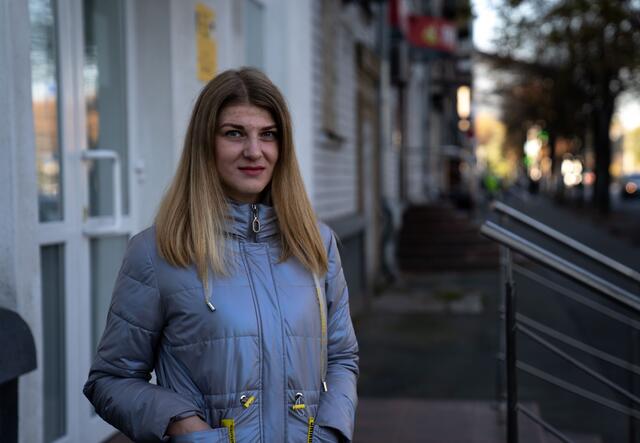
Tetyana (pictured above), her husband, and 3-year-old Zlata fled their home in Severodonetsk as the city came under heavy bombing early in the conflict. She has been taking English classes twice a week at the IRC women’s centre in Dnirpo.
She describes the centre as a “huge benefit”, not only for learning, but also for her mental health. “When you come to the centre you leave it more fulfilled, more energetic, and you have the desire to live despite the constant anxiety,” Tetyana says.
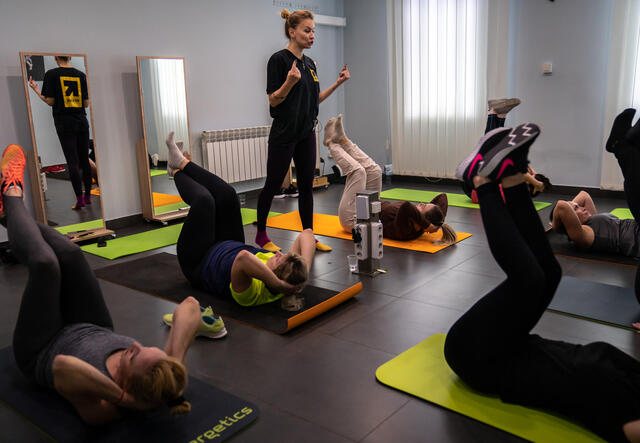
In Warsaw, Poland, in partnership with a local organisation, the IRC has opened a safe haven for women who have fled Ukraine and experienced violence. This calm and comfortable space offers women a place to stay, receive counselling and other psychosocial support and information, learn about their rights as refugees, and get referred to a wide range of support services
The United Nations estimates that over four million children across Ukraine need humanitarian assistance, and that two thirds of them have been forced to flee their homes.
The IRC’s Safe Healing and Learning Spaces in Ukraine, Poland and Moldova provide a caring, stable environment where children can go during the day. Staff facilitate games that foster social and emotional learning, so youngsters can better cope with the conflict and negative feelings.
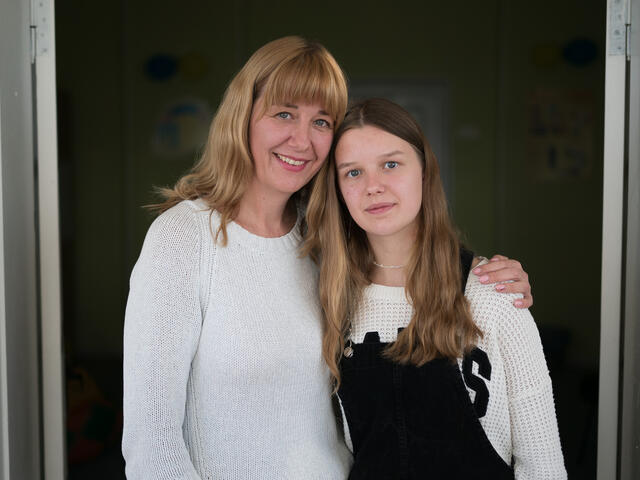
Yanna, 13, (pictured above with her mother Inna) has benefitted from the IRC’S Safe and Healing Learning Space in Vinnytsia, a city in west-central Ukraine. Her family fled their native city Debaltseve in 2014, when the conflict in eastern Ukraine started.
Because she has been displaced for several years, Yanna has found it particularly helpful to spend time with other children her age and receive psychological support.
“Everyone became more open, sociable,” says Yanna of the support the IRC centre provides. “We became friends. Everyone has become more cheerful, friendly. We have become stronger.”
“The children really need it,” says Inna. “They come with the hope that tomorrow everything will be over. We understand that it is unlikely.”
Over the course of the past year the IRC has supported over 15,000 children across Europe.
Everyone became more open, sociable. We became friends. We have become stronger.
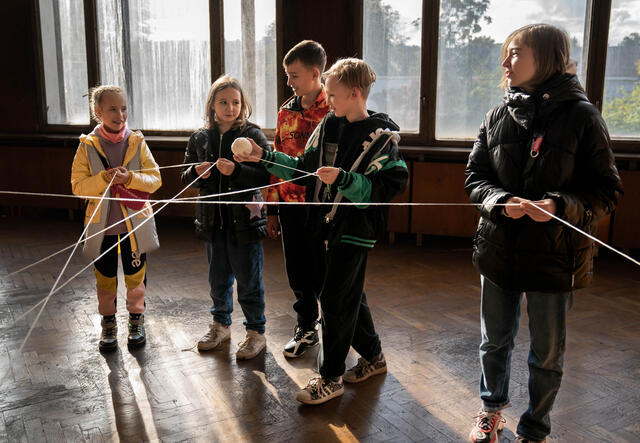
Over 760 health facilities in Ukraine have been attacked over the past year. With so many hospitals destroyed or damaged, people often travel long distances with limited public transportation to find care at the nearest health facility.
On top of this, increased transport and medication costs and a shortage of health professionals are making it harder for people in Ukraine to access essential services.
To date, the IRC has equipped 50 medical facilities across the country with critical supplies, equipment and medicines. We are also running a mobile clinic in the Kharkiv region to reach people in need, training healthcare workers to give on-the-go care and mental health services.
The IRC is working around the globe to support people forced to flee Ukraine. As the conflict continues, we are addressing the evolving needs of refugees in Poland, Moldova, Romania, Hungary, Slovakia, Czechia and Bulgaria, as well as in Germany, Italy, Greece, the U.K. and the U.S.
IRC staff were on the ground in Poland before the conflict began, working with partners to monitor the situation and identify where we could be most effective. We’ve since scaled up and joined forces with local nonprofits and companies to leverage their experience to increase our impact.
For example, the IRC is working with the Polish Forum for Migration to reach newly arrived refugees with information on civil rights and access to assistance; and with Feminoteka to help women heal.
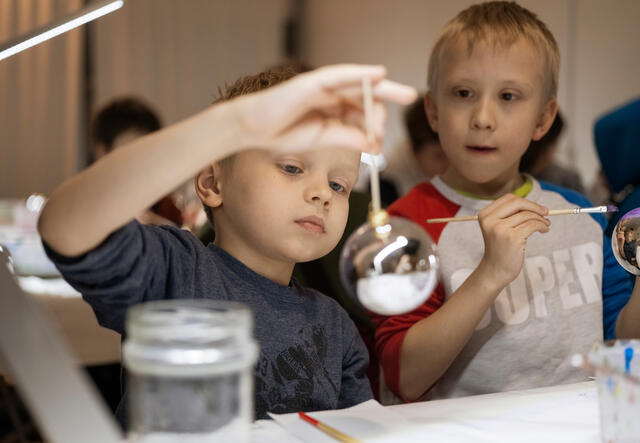
We are also partnering with start-up Migam to provide sign language translation for deaf people forced to flee Ukraine. When Ukrainians arrive at the Polish border, they now see posters and signage explaining how to launch the free service via a web browser, mobile application, or any device equipped with a camera and internet access.
By the end of January 2023, the IRC supported around 90,000 affected people in Poland, many of whom are staying in shelters across the country, with financial assistance, psychological support and education services.
Through our 28 offices across the United States, the IRC is providing immediate aid to refugees, including food, clothing, medical attention and housing. We facilitate access to the tools of self-reliance—education, English-language classes, community orientation, and employment skills and job placement.
Recently, the IRC has also pioneered new remote services, which have aided thousands of Ukrainians, including the Uniting for Ukraine Support Line and the digital SettleIn project.
In the UK, we partner with local county councils to help people integrate in their new communities. Our work includes orientation for newcomers, employment counselling, peer mentorship and leadership training.
Donate now: Your gift will ensure we can continue to support families whose lives are shattered by conflict and crises around the world.